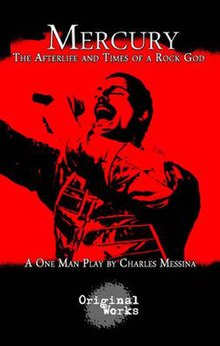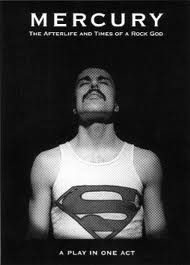Mercury: The Afterlife and Times of a Rock God
| Mercury: The Afterlife and Times of a Rock God | |
|---|---|

Front cover of the first published edition of the play
|
|
| Written by | Charles Messina |
| Characters | Freddie Mercury |
| Date premiered | November 24, 1997 |
| Place premiered | Sanford Meisner Theatre New York, NY |
| Original language | English |
| Genre | Monodrama |
| Setting | A room |

Promotional postcard for the second run of Mercury: The Afterlife and Times of a Rock God
|

Promotional postcard for the third run of Mercury: The Afterlife and Times of a Rock God
|
Mercury: The Afterlife and Times of a Rock God is a monodrama written by Charles Messina about the life and death of Queen lead singer Freddie Mercury. It presents Mercury in the moments just after his death, during which he is confronted with self-examination as he "seeks redemption before a God unimpressed by his celebrity."
Farrokh Bulsara was a boy of Persian heritage who never quite fit into his skin or his teeth. It wasn’t until he became a young man that he discovered his talent and true nature, and was reborn as Freddie Mercury. After a brilliant career, with the arenas empty and the lights out, on the night of November 24, 1991, Freddie is forced to surrender his celebrity and face the frailty of his own humanity. As he succumbs to AIDS, the worldwide icon seeks redemption before a God unimpressed with celebrity. In his ultimate struggle to make sense of his grim fate, Mercury realizes that his fame, fortune, and talents are no longer enough to sustain him; that beyond the darkness of his fears, shines a light far brighter than the star he was on Earth.
The play debuted at the Sanford Meisner Theatre in New York City's Chelsea district on November 24, 1997 at 6:48pm - the 6th anniversary of Mercury's death. The part of Freddie was played by Khalid Gonçalves (né Paul Gonçalves).
On opening night of the play, then-New York City Council member Tom Duane introduced the show.
The play ran every night until December 7.
The play began its second run on February 14, 1998.
On February 17, rock musician Billy Squier, a longtime friend of Freddie's, debuted a song that he wrote in memory of him titled I Have Watched You Fly. He introduced the song by saying, "I knew Freddie as a friend. I'm honored to share the stage with him in the afterlife."
The play was also performed every night during the second run, ending on March 8, 1998.
Proceeds from the ticket sales of both runs were donated to Gay Men's Health Crisis and The Mercury Phoenix Trust.
...
Wikipedia
